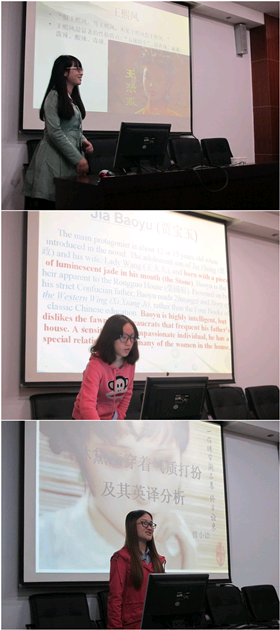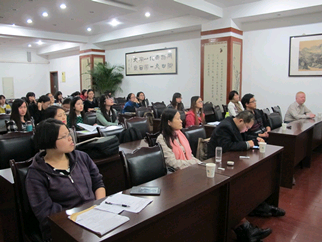“A Bite of the Classic Gives a ‘Red Dream’”, the first reading seminar, was held by Graduate Student Union of School of Foreign Languages (SFL) at 7:30 p.m. on Oct 30th in the lecture hall of the School. Li Lixi, a first year graduate student from the Department of English Language and Literature, presided over the seminar in which first year graduate students Li Cuifang, Ma Siqi and Zeng Xiaoyu acted as the keynote speakers. Dr. Wang Pengfei, vice dean of SLF, Dr. Wang Junqi, the director of TCFL, Shang Tuo, Tang Jun and the graduate student counselor Liu Mingyang attended the seminar as guests of honour.

As the first reading seminar in this semester, its theme was “The Translation of the Images of Jia Baoyu, Lin Daiyu and Wang Xifeng in Chapter 3 of A Dream of Red Mansions in Hawkes’ English version”. Li Cuifang, in her analysis of the character Wang Xifeng, gave us some examples and spelled out the translation strategies adopted in Hawkes’ version of A Dream of Red Mansions, i.e., domestication, fuzziness and even omission. She also made a detailed comparison between Hawkes’ version and Yang Xianyi’s in this Chapter, which triggered a heated debate among the audience. However, Dr. Tang Jun warned students about the “omission” strategy, because sometimes “omission” in translation might be caused by the interpretation of different editions of the source language scripts. As A Dream of Red Mansions has lots of editions, we should be more careful. This instruction was also cemented by Mr. Wang Pengfei’s stress on the importance of the source language scripts.
Ma Siqi, when discussing Jia Baoyu’s image in the translation, indicated that based on her study, Hawkes’ several amplifications in translation could not fully convey the cultural implications. In the translation of the two Xijiangyue poems depicting Jia’s image, Ma found that Hawkes used the iambic pentameter and reproduced a poetic sense among the readers. However, his translation gave us a sheer derogatory description of Jia and failed to reflect the commendatory attitude of the author towards Jia Baoyu behind the superficial criticism. In response to Ma’s comments, Shang Tuo and Dr. Wang Junqi pointed out that the loss of information was inevitable in the translation of classics. Dr. Wang Junqi also reminded the students that attention should be paid to the values that that translation criticism can bring to the development of translation theories in the course of criticism.

Zeng Xiaoyu presented her understanding of the translation of Lin Daiyu in Hawkes’ version. She began with the original image of Lin Daiyu in four aspects as she was of the opinion that an accurate translation was based on the full digestion and in-depth analysis of source language scripts. She stressed that the addition of some words or simplification of the context in Hawkes’ translation of poems describing Lin Daiyu aimed to increase the translation’s acceptability among western readers.
ln his summary at the end of the activity, Wang Pengfei, the Vice Dean of the School and one of the advocates of the seminar, spoke highly of the three speakers and thanked the students and teachers for their participation. He said that such kinds of activities could help students focus on studying the texts and arouse students’ interests, developing their competences in academic researches.